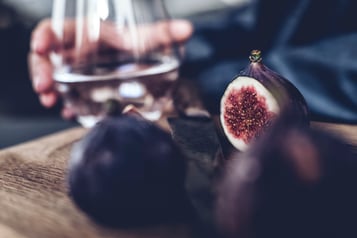Can temperature affect your love of food and drink?
Water is a bit like marmite, you either love it or hate it. Whether you find it boring, tasteless or flavourless, it is needed for our bodies hydration and wellness. You can impact how it tastes, the effect it can have on foods you are eating and your enjoyment levels when you understand how temperature effects your 10,000 taste buds.
Even from an early age I was introduced to adding something to water to encourage me to drink it. Depending on your age you may or may never have experienced a powdered orange juice drink. You added the sachet to water and it would make up a jug full, we had Apeel by Bird’s, but Kellogg’s also did one called Rise n Shine. Now we have squash, which is such a British thing by the way or maybe you just don’t drink water at all? Is it down to the taste, it’s boring or that there is always something more exciting to choose.
As a child our drinks were always kept in the fridge, or I’d watch my parents and grandparents run the cold tap, put a finger under to see if it was cold enough before filling up our glasses. Guess what, I still do this now. But this has influenced me in the temperature to which I prefer to drink, and that’s around 4-5oC, ideally straight from the fridge or chiller cabinet.
ROOM TEMPERATURE
Travelling in Asia, I noticed that drinks were served at room temperature, and that people mostly drank hot water. This is from a historical basis that in the 1930’s, to prevent people from getting infectious diseases they suggested boiling water to kill of the microbes and bacteria. Continuing to do this to this day, with the thought that it also supports digestion and wellness, and their preferred taste. In Britain, we have strict water treatment plants that we can drink water directly from the tap, rather than having to boil it.

HARD WATER VS SOFT
Across the UK you get a different tap water drinking experience depending on where you are, this is a mixture of subjectivity, science, and geography. Hard water areas, across the south and east, where you may experience a “chalky mouthfeel” due to the calcium and magnesium contents. Where soft water areas, throughout Scotland, Cornwall, Devon, parts of Wales and Northern Ireland, are thought to have less “taste” and only contains sodium. But is taste the same as flavour?
TASTE
Flavour is a mixture of sensory information – taste, smell and the tactile sensation that is known as “mouthfeel” – when we say we are experience water as “light” or “heavy” in the mouth. Where as 10,000 taste buds determine how we sense taste. With receptors on our tongue allowing us to distinguish between tastes – sweet, savoury, bitter, salty and sour.
The reason foods taste different at different temperatures, and we have a preference for drinks at specific temperatures is because our taste buds for sweet, bitter and sour work best within a specific temperature range: from 15-35oC. 15oC being cool room temperature (average UK room temp is 18oC) and 35oC being lukewarm (just below body temperature, 37oC).
Best way to describe sweet taste buds are to think of my can of Coca-Cola that has been left on the side, how sweet it is compared to when it comes straight out of the fridge – sickly sweet. Or chocolate that is kept in the fridge (best place in my opinion – especially Cadbury Giant Chocolate Buttons) is less sweet, also less “chocolatey” and less creamy. With these two examples it shows my taste buds are less sweet.
Other examples include is beer as it gets warmer is more bitter, or how piping hot vegetables are less bitter and have stronger taste than those served at room temperature. Or that cheese becomes sourer at room temperature – think of French smelly cheese.
Impacting on you eating these foods is the temperature of your mouth, some examples:
- Drinking a glass of chilled or iced water either just before or with your meal (any beverage <15C), sweet/savoury/bitter tastes will be weaker
- The same is true if you have a glass of hot water or a hot drink like tea/herbal tea (any beverage >35C)
- However, if you have a room temperature or lukewarm drink (any beverage between 15-35C), sweet/savoury/bitter flavours will be amplified

Having the right water, at the right temperature can make or break the experience of a meal. Water sommeliers, someone who is educated in the properties of water and the elements that affect it, have taken the time to work with LUQEL to pair the right water and its mineral properties to compliment the 30 recipes available in the LUQEL Water Station. Doing the hard work for us and adding flavour to water by balancing our taste receptors and increasing the enjoyment factor. Each glass of water from LUQEL is the same no matter where in the country or world, you dispense a glass, this is down the unique three stage filtration process which creates a base pure water before the minerals are added back in to create your individual water.
I am still occasionally having Vimto squash in my water, but I’ve increase the temperature that I am drinkin it at and enjoying the new taste. Not sure I will be converted to room temperature “fat” coke vs chilled. Maybe that will change as I get older!

LUQEL WATER STATION
LUQEL is a pioneer in water technology, its’ mission is to radically change the way people drink water to make a lasting difference. Visionary innovations make plastic superfluous. With our perfect purification process, individual mineralisation, ‘smart’ bottles and the digitalised eco-system, our products turn tap water into a whole new level of water enjoyment, “Water as individual as you are”.

